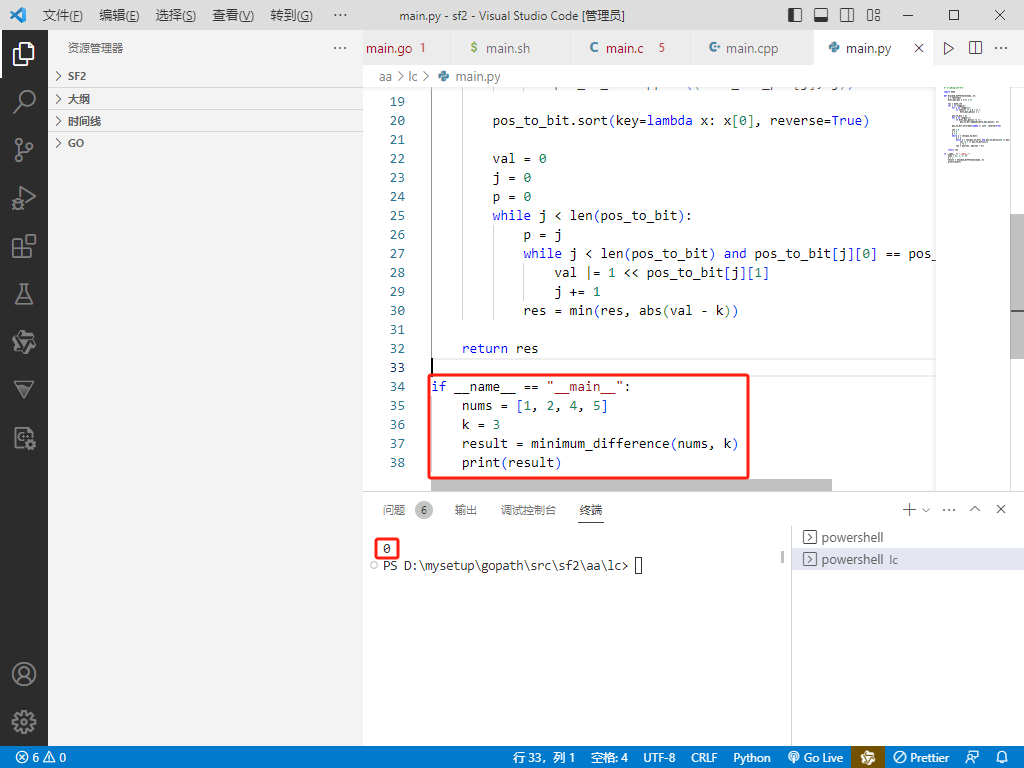2025-01-08:找到按位或最接近 K 的子数组。用go语言,给定一个数组 nums 和一个整数 k,你的目标是找到一个子数组,使得该子数组中所有元素进行按位或运算后的结果与 k 之间的绝对差值尽量小。
具体地,你需要确定一个子数组 nums[l..r],使得以下表达式的值最小化:
|k - (nums[l] OR nums[l + 1] ... OR nums[r])|
最后,返回这个最小绝对差值。
这里所说的子数组指的是数组中连续的非空元素序列。
1 <= nums.length <= 100000。
1 <= nums[i] <= 1000000000。
1 <= k <= 1000000000。
输入:nums = [1,2,4,5], k = 3。
输出:0。
解释:
子数组 nums[0..1] 的按位 OR 运算值为 3 ,得到最小差值 |3 - 3| = 0 。
答案2025-01-08:
题目来自leetcode3171。
大体步骤如下:
1.初始化 bitsMaxPos 数组,用于记录每个元素在每位上的最大位置,初始值为 -1。
2.初始化结果 res 为整数最大值 math.MaxInt。
3.遍历数组 nums:
a. 对于每个元素,记录其在 bitsMaxPos 数组中每位上的位置,即进行按位运算并更新 bitsMaxPos。
b. 构建二维数组 posToBit,记录每个位的最大位置和该位的值。
c. 按照每位最大位置倒序排序 posToBit 数组。
d. 遍历 posToBit 数组,计算包含当前位的所有可能组合的按位或值,更新结果 res。
4.最终返回 res 作为最小绝对差值。
总体而言,这个算法的时间复杂度取决于数组长度 n,其中对数组进行了遍历和排序操作。
额外空间复杂度主要取决于辅助数组的大小和额外变量的空间开销,约为 O(n)。
Go完整代码如下:
go
package main
import (
"fmt"
"sort"
"math"
)
func minimumDifference(nums []int, k int) int {
n := len(nums)
bitsMaxPos := make([]int, 31)
for i := range bitsMaxPos {
bitsMaxPos[i] = -1
}
res := math.MaxInt
for i := 0; i < n; i++ {
for j := 0; j <= 30; j++ {
if nums[i]>>j & 1 == 1 {
bitsMaxPos[j] = i
}
}
posToBit := make([][2]int, 0)
for j := 0; j <= 30; j++ {
if bitsMaxPos[j] != -1 {
posToBit = append(posToBit, [2]int{bitsMaxPos[j], j})
}
}
sort.Slice(posToBit, func(a, b int) bool {
return posToBit[a][0] > posToBit[b][0]
})
val := 0
for j, p := 0, 0; j < len(posToBit); p = j {
for j < len(posToBit) && posToBit[j][0] == posToBit[p][0] {
val |= 1 << posToBit[j][1]
j++
}
res = min(res, int(math.Abs(float64(val - k))))
}
}
return res
}
func main() {
nums := []int{1,2,4,5}
k := 3
result := minimumDifference(nums,k)
fmt.Println(result)
}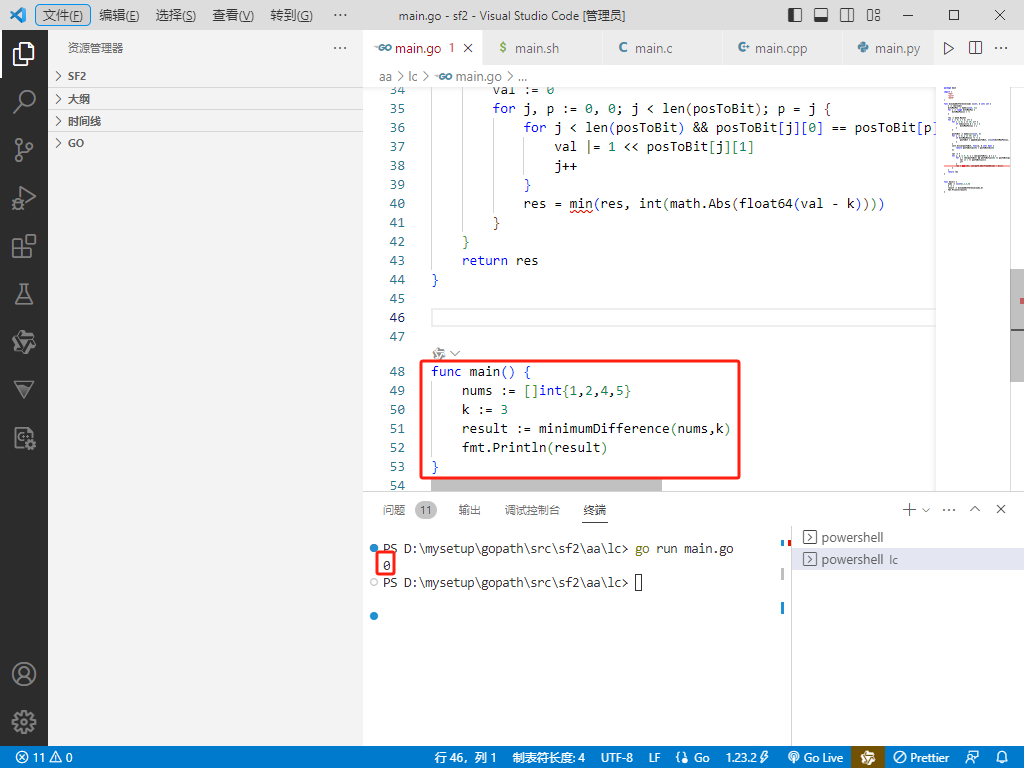
Rust完整代码如下:
rust
use std::cmp;
use std::collections::HashSet;
fn minimum_difference(nums: Vec<i32>, k: i32) -> i32 {
let n = nums.len();
let mut bits_max_pos = [-1; 31];
let mut res = i32::MAX;
for i in 0..n {
for j in 0..=30 {
if nums[i] >> j & 1 == 1 {
bits_max_pos[j] = i as i32;
}
}
let mut pos_to_bit: Vec<(i32, i32)> = Vec::new();
for j in 0..=30 {
if bits_max_pos[j] != -1 {
pos_to_bit.push((bits_max_pos[j], j as i32));
}
}
pos_to_bit.sort_by(|a, b| b.0.cmp(&a.0));
let mut val = 0;
let mut j = 0;
let mut p = 0;
while j < pos_to_bit.len() {
p = j;
while j < pos_to_bit.len() && pos_to_bit[j].0 == pos_to_bit[p].0 {
val |= 1 << pos_to_bit[j].1;
j += 1;
}
res = cmp::min(res, (val - k).abs() as i32);
}
}
res
}
fn main() {
let nums = vec![1, 2, 4, 5];
let k = 3;
let result = minimum_difference(nums, k);
println!("{}", result);
}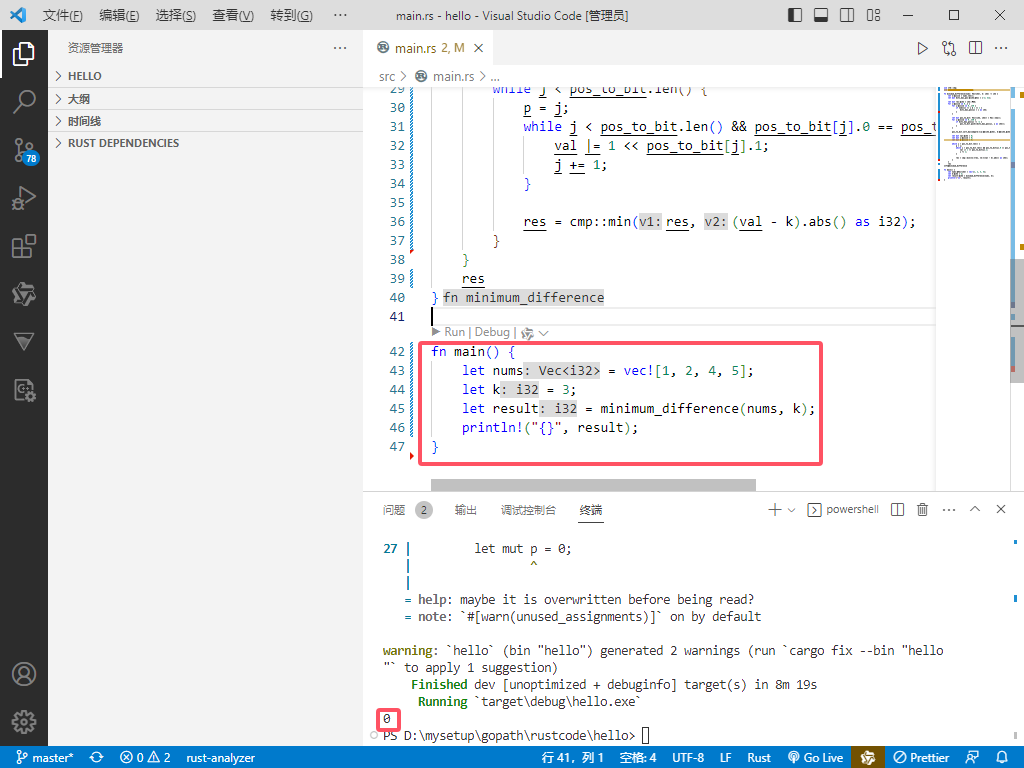
C完整代码如下:
c
#include <stdio.h>
#include <stdlib.h>
#include <math.h>
// Helper function to find the minimum of two integers
int min(int a, int b) {
return (a < b) ? a : b;
}
int minimumDifference(int nums[], int size, int k) {
int bitsMaxPos[31];
for (int i = 0; i < 31; i++) {
bitsMaxPos[i] = -1;
}
int res = INT_MAX;
for (int i = 0; i < size; i++) {
for (int j = 0; j <= 30; j++) {
if ((nums[i] >> j) & 1 == 1) {
bitsMaxPos[j] = i;
}
}
int posToBit[size][2];
int count = 0;
for (int j = 0; j <= 30; j++) {
if (bitsMaxPos[j] != -1) {
posToBit[count][0] = bitsMaxPos[j];
posToBit[count][1] = j;
count++;
}
}
// Sort
for (int a = 0; a < count; a++) {
for (int b = a+1; b < count; b++) {
if (posToBit[a][0] < posToBit[b][0]) {
int temp0 = posToBit[a][0];
int temp1 = posToBit[a][1];
posToBit[a][0] = posToBit[b][0];
posToBit[a][1] = posToBit[b][1];
posToBit[b][0] = temp0;
posToBit[b][1] = temp1;
}
}
}
int val = 0;
for (int j = 0, p = 0; j < count; p = j) {
while (j < count && posToBit[j][0] == posToBit[p][0]) {
val |= 1 << posToBit[j][1];
j++;
}
res = min(res, abs(val - k));
}
}
return res;
}
int main() {
int nums[] = {1, 2, 4, 5};
int size = sizeof(nums) / sizeof(nums[0]);
int k = 3;
int result = minimumDifference(nums, size, k);
printf("%d\n", result);
return 0;
}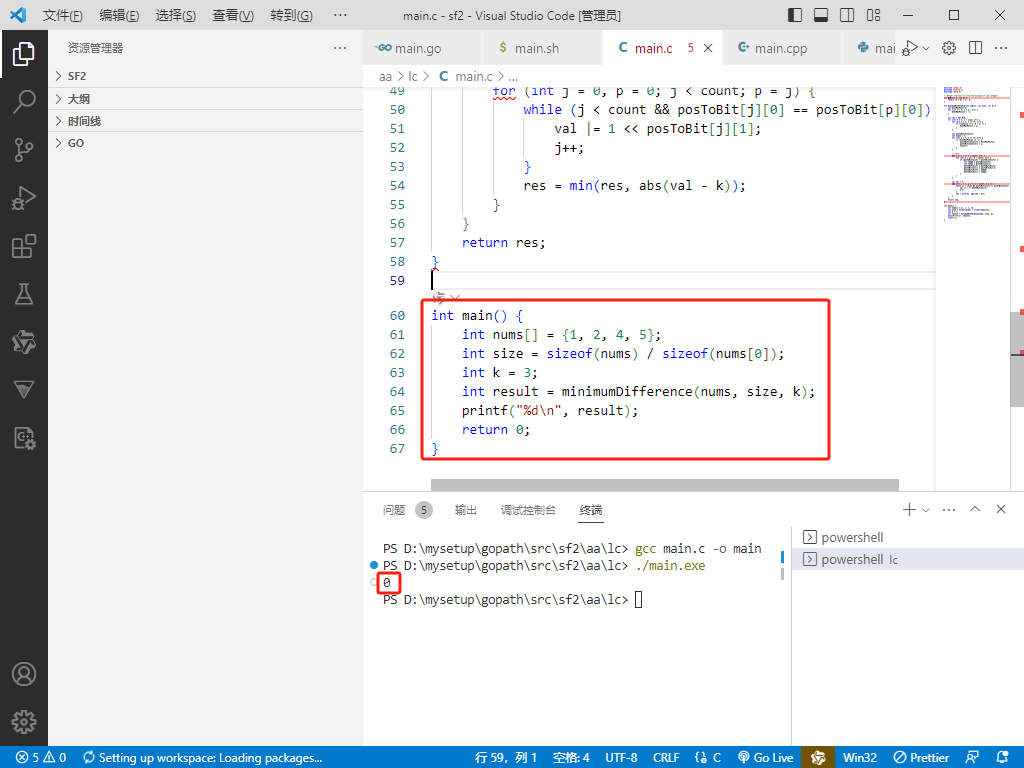
C++完整代码如下:
cpp
#include <iostream>
#include <vector>
#include <algorithm>
#include <cmath>
#include <climits>
int min(int a, int b) {
return (a < b) ? a : b;
}
int minimumDifference(std::vector<int> nums, int k) {
int n = nums.size();
std::vector<int> bitsMaxPos(31, -1);
int res = INT_MAX;
for (int i = 0; i < n; i++) {
for (int j = 0; j <= 30; j++) {
if ((nums[i] >> j) & 1 == 1) {
bitsMaxPos[j] = i;
}
}
std::vector<std::pair<int, int>> posToBit;
for (int j = 0; j <= 30; j++) {
if (bitsMaxPos[j] != -1) {
posToBit.push_back(std::make_pair(bitsMaxPos[j], j));
}
}
std::sort(posToBit.begin(), posToBit.end(), [](const std::pair<int, int>& a, const std::pair<int, int>& b) {
return a.first > b.first;
});
int val = 0;
for (int j = 0, p = 0; j < posToBit.size(); p = j) {
while (j < posToBit.size() && posToBit[j].first == posToBit[p].first) {
val |= 1 << posToBit[j].second;
j++;
}
res = min(res, std::abs(val - k));
}
}
return res;
}
int main() {
std::vector<int> nums = {1, 2, 4, 5};
int k = 3;
int result = minimumDifference(nums, k);
std::cout << result << std::endl;
return 0;
}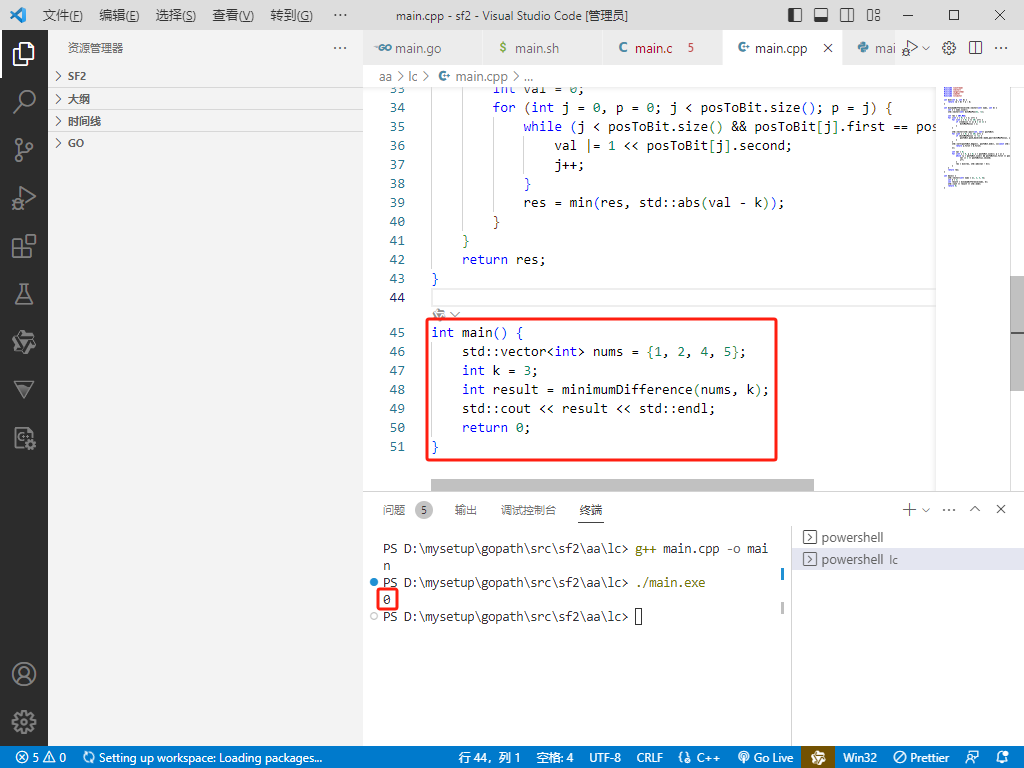
Python完整代码如下:
python
# -*-coding:utf-8-*-
import math
def minimum_difference(nums, k):
n = len(nums)
bits_max_pos = [-1] * 31
res = math.inf
for i in range(n):
for j in range(31):
if nums[i] >> j & 1 == 1:
bits_max_pos[j] = i
pos_to_bit = []
for j in range(31):
if bits_max_pos[j] != -1:
pos_to_bit.append((bits_max_pos[j], j))
pos_to_bit.sort(key=lambda x: x[0], reverse=True)
val = 0
j = 0
p = 0
while j < len(pos_to_bit):
p = j
while j < len(pos_to_bit) and pos_to_bit[j][0] == pos_to_bit[p][0]:
val |= 1 << pos_to_bit[j][1]
j += 1
res = min(res, abs(val - k))
return res
if __name__ == "__main__":
nums = [1, 2, 4, 5]
k = 3
result = minimum_difference(nums, k)
print(result)